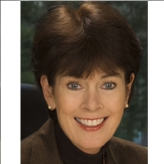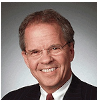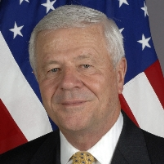Netherlands
 Jones-Bos, Renée
Jones-Bos, Renée
- Table of Contents
- News
- Overview
- Basic Information
- History
- Newspapers
- History of U.S. Relations with Netherlands
- Current U.S. Relations with Netherlands
- Where Does the Money Flow
- Controversies
- Human Rights
- Debate
- Past Ambassadors
- Ambassador to the U.S.
- Embassy Web Site in the U.S.
- Comments
- Leave a comment
U.S. Ambassador to Netherlands

Obama fundraiser Timothy Broas is getting a do-over. Despite an embarrassing late night arrest for drunk driving and resisting arrest in June 2012 that killed his nomination to be the next ambassador to the Netherlands, Broas was re-nominated by Obama on July 18 of this year to be his man in The Hague.
Broas, then 58, was pulled over by Montgomery County, Maryland, police at 1:18 a.m. on June 19, 2012, in Chevy Chase, Maryland, and charged with “attempting to drive [a] vehicle while under the influence of alcohol,” driving 47 miles per hour in a 35 mph zone, and resisting arrest, the latter charge being criminal in nature. The White House announced the withdrawal of his nomination on June 28.
Broas—ironically a white collar criminal defense attorney—got the kind of plea deal men of wealth and position often get: Broas pled guilty to a lesser offense of driving while impaired; prosecutors dropped the more serious charges; and Broas was sentenced to probation before judgment—meaning he was not formally convicted of the offense and has no criminal record.
A partner in the Washington, DC, office of the Chicago-based law firm of Winston & Strawn, Broas has raised more than $500,000 for Obama’s re-election efforts as a bundler…in other words, he raised the money from friends, family, or business associates. For Obama’s 2008 campaign, Broas bundled between $200,000 and $500,000. Obama, like every modern President before him, has nominated about two dozen bundlers to ambassadorships. In addition to the bundling, Broas has personally donated more than $230,000 to federal candidates, parties, and political committees since 1989, according to the Center for Responsive Politics, but only two Republicans have benefited: Bob Dole in 1996, to whom Broas donated $500; and George W. Bush in 2004, who received $2,000, even as Broas donated $3,500 to Democratic nominee John Kerry and $25,000 to the Democratic National Committee.
According to records released by the Obama administration, Broas has visited the White House 39 times since 2009, including eight visits with the president and five West Wing meetings with Pete Rouse, a top adviser who served as Obama’s chief of staff and is now the president’s counselor.
Tim Broas was one of the nine children born to Anita and William Broas, who was a marketing executive for the Warner Lambert pharmaceutical company. Born circa 1954, Broas graduated from Delbarton prep school in Morristown, New Jersey, in 1972, earned an A.B. in Economics and History at Boston College in 1976 and a J.D. from the College of William and Mary in 1979. From 1979 to 1980, Broas served as a law clerk for Justice Mark Sullivan of the Supreme Court of New Jersey.
He started his private practice career as an associate at two New York City law firms: Conboy, Hewitt, O’Brien & Boardman from 1980 to 1983 and Whitman & Ransom from 1983 to 1985. Relocating to Washington, DC, Broas was a partner at Anderson, Hibey & Blair from 1986 to 1995, when he joined the DC office of the Chicago-based law firm of Winston & Strawn, where he has specialized in white-collar criminal defense ever since.
Clients Broas has represented include UBS Securities, LLC; Legg Mason; Otsuka America Pharmaceuticals, Inc.; Alstom Holdings; Ingersoll-Rand, Ltd.; and Papa John’s International, Inc. He also represented the left-leaning group Citizen Action until it was shut down because of its involvement in funding a Teamsters election campaign, and Neil Volz, chief of staff to Rep. Bob Ney (R-Ohio), during the unfolding of the Jack Abramoff scandal in 2005-2006.
In 2005, Broas was appointed to the Board of Visitors of Mount Vernon by Virginia Gov. Mark Warner and was reappointed in 2009 by Governor Tim Kaine; both are Democrats. He was appointed by Maryland Governor Martin O’Malley (also a Democrat) to the Board of Trustees of St. Mary’s College of Maryland in 2011. In 2010, President Obama appointed Broas to the Board of Trustees of the Woodrow Wilson International Center for Scholars, a nonpartisan think tank created by Congress in 1968.
Timothy Broas is married to fellow attorney Julie Broas, who practiced labor law for two decades at the Washington, DC, office of the Jones, Day law firm and now works at the Washington Legal Clinic for the Homeless as the Jones Day Senior Fellow. He has three daughters: Emily, Allison, and Madeline.
-Matt Bewig
To Learn More:
Statement Before the Senate Foreign Relations Committee (pdf)
Obama Nominee Gets Second Chance after DUI Arrest (by Aamer Madhani and Fredreka Schouten, USA Today)
morePrevious U.S. Ambassador to Netherlands

 Jones-Bos, Renée
Jones-Bos, Renée
Comments
U.S. Ambassador to Netherlands

Obama fundraiser Timothy Broas is getting a do-over. Despite an embarrassing late night arrest for drunk driving and resisting arrest in June 2012 that killed his nomination to be the next ambassador to the Netherlands, Broas was re-nominated by Obama on July 18 of this year to be his man in The Hague.
Broas, then 58, was pulled over by Montgomery County, Maryland, police at 1:18 a.m. on June 19, 2012, in Chevy Chase, Maryland, and charged with “attempting to drive [a] vehicle while under the influence of alcohol,” driving 47 miles per hour in a 35 mph zone, and resisting arrest, the latter charge being criminal in nature. The White House announced the withdrawal of his nomination on June 28.
Broas—ironically a white collar criminal defense attorney—got the kind of plea deal men of wealth and position often get: Broas pled guilty to a lesser offense of driving while impaired; prosecutors dropped the more serious charges; and Broas was sentenced to probation before judgment—meaning he was not formally convicted of the offense and has no criminal record.
A partner in the Washington, DC, office of the Chicago-based law firm of Winston & Strawn, Broas has raised more than $500,000 for Obama’s re-election efforts as a bundler…in other words, he raised the money from friends, family, or business associates. For Obama’s 2008 campaign, Broas bundled between $200,000 and $500,000. Obama, like every modern President before him, has nominated about two dozen bundlers to ambassadorships. In addition to the bundling, Broas has personally donated more than $230,000 to federal candidates, parties, and political committees since 1989, according to the Center for Responsive Politics, but only two Republicans have benefited: Bob Dole in 1996, to whom Broas donated $500; and George W. Bush in 2004, who received $2,000, even as Broas donated $3,500 to Democratic nominee John Kerry and $25,000 to the Democratic National Committee.
According to records released by the Obama administration, Broas has visited the White House 39 times since 2009, including eight visits with the president and five West Wing meetings with Pete Rouse, a top adviser who served as Obama’s chief of staff and is now the president’s counselor.
Tim Broas was one of the nine children born to Anita and William Broas, who was a marketing executive for the Warner Lambert pharmaceutical company. Born circa 1954, Broas graduated from Delbarton prep school in Morristown, New Jersey, in 1972, earned an A.B. in Economics and History at Boston College in 1976 and a J.D. from the College of William and Mary in 1979. From 1979 to 1980, Broas served as a law clerk for Justice Mark Sullivan of the Supreme Court of New Jersey.
He started his private practice career as an associate at two New York City law firms: Conboy, Hewitt, O’Brien & Boardman from 1980 to 1983 and Whitman & Ransom from 1983 to 1985. Relocating to Washington, DC, Broas was a partner at Anderson, Hibey & Blair from 1986 to 1995, when he joined the DC office of the Chicago-based law firm of Winston & Strawn, where he has specialized in white-collar criminal defense ever since.
Clients Broas has represented include UBS Securities, LLC; Legg Mason; Otsuka America Pharmaceuticals, Inc.; Alstom Holdings; Ingersoll-Rand, Ltd.; and Papa John’s International, Inc. He also represented the left-leaning group Citizen Action until it was shut down because of its involvement in funding a Teamsters election campaign, and Neil Volz, chief of staff to Rep. Bob Ney (R-Ohio), during the unfolding of the Jack Abramoff scandal in 2005-2006.
In 2005, Broas was appointed to the Board of Visitors of Mount Vernon by Virginia Gov. Mark Warner and was reappointed in 2009 by Governor Tim Kaine; both are Democrats. He was appointed by Maryland Governor Martin O’Malley (also a Democrat) to the Board of Trustees of St. Mary’s College of Maryland in 2011. In 2010, President Obama appointed Broas to the Board of Trustees of the Woodrow Wilson International Center for Scholars, a nonpartisan think tank created by Congress in 1968.
Timothy Broas is married to fellow attorney Julie Broas, who practiced labor law for two decades at the Washington, DC, office of the Jones, Day law firm and now works at the Washington Legal Clinic for the Homeless as the Jones Day Senior Fellow. He has three daughters: Emily, Allison, and Madeline.
-Matt Bewig
To Learn More:
Statement Before the Senate Foreign Relations Committee (pdf)
Obama Nominee Gets Second Chance after DUI Arrest (by Aamer Madhani and Fredreka Schouten, USA Today)
morePrevious U.S. Ambassador to Netherlands








Comments